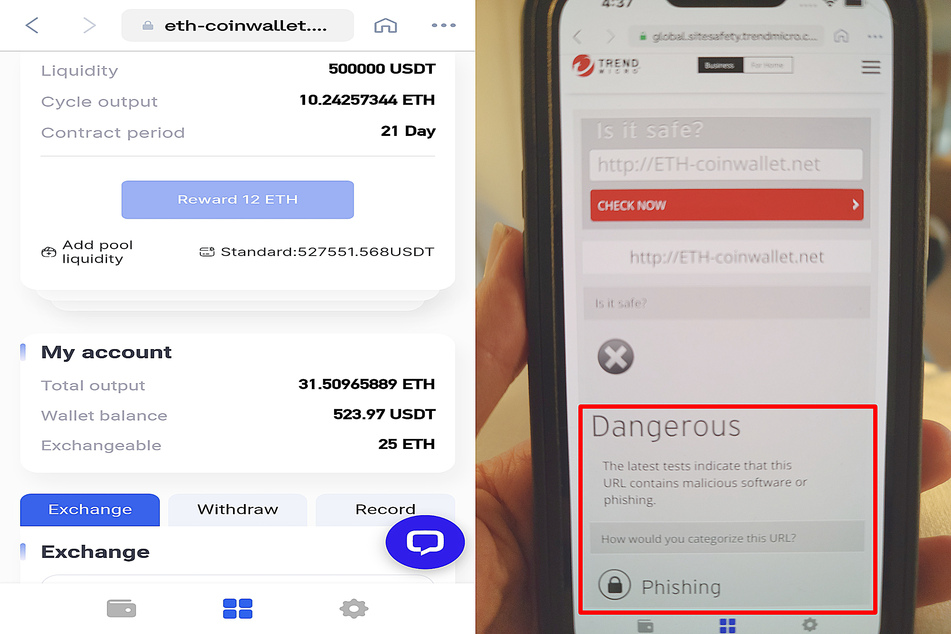Crypto con: How a scam swindled an Ethereum trader out of half a million dollars
New York, New York - The unregulated crypto trading market can make a select few a lot of money, but it has a dark and sleazy underbelly, where scammers will do their best to pull the wool over your head. That's exactly what happened to a trader who told TAG24 how he got swindled out of a huge sum of money.

John (not his real name) only got into cryptocurrency trading in November 2021. Or at least that's what he thought he was doing, because the website he was using turned out to be a scam that cost him a total of $527,000.
The site advertised itself as an Ethereum mining pool and would pay out profits to investors, on the order of "$30,000 a day," to those who put in the most money.
A person pretending to be a friendly fellow investor sent John a fraudulent link to the site from their "retired finance guru aunt" and even helped him set up his "investing" account. The pitch really hooked him with the promise of quick riches.
"They throw events at you, like the Christmas Event," he told TAG24. This fake event promised to give him free Ethereum for different deposit levels.
The big realization dawned on Jpn when he tried to withdraw some of his funds for the first time.
"That's when I started to become suspicious, because I tested the system by trying to withdraw money... It didn't go anywhere."
"So I was like, 'alright, this is screwed.' And then I started seeing more bad signs, from their link being flagged," he added.
After getting the runaround from the scammers pretending to be customer support, John was asked to deposit even more money to withdraw his account's funds, which made him finally cut ties and stop depositing funds on the fraudulent site.
Get out of there!

John also got in touch with Coinbase, a major cryptocurrency trading platform, last month. By that point, he thought something smelled fishy, so he sent them screenshots of the scam website to check if it was legit.
Unfortunately, that route quickly turned into a dead end, because Coinbase confirmed that it was in no way connected to the site he had been tricked into using.
The only advice he got was to cut ties with the fraudsters and get in touch with his local authorities, which he has since done.
Coinbase also banned him from using their platform, with the cryptic explanation that his account was blocked for "unauthorized activity."
Despite the nasty experience with scammers, John hasn't been completely put off crypto trading.
"I still believe that it's the future. The main thing for me is that it doesn't happen to somebody else," he explained.
The Pig-Butchering Scam

John isn't the only one to lose massive piles of cash to crypto scammers.
A non-profit scam watchdog, Global Anti-Scam, has an article about the exact type of scam he got hit with, called The Pig-Butchering Scam.
It describes a scheme in which young, good-looking men and women reach out to people on social media and dating apps, build up trust by chatting them up about investing, and then forward them one of thousands of fraudulent links.
Then, the victim deposits money (which they will never see again) and is baited into depositing more for bigger profits. But by the time they realize they've been duped, the would-be investors have already lost an average of $120,000.
GASO has a list of over 5000 scam websites, and tips on recognizing schemes like this one. The official Coinbase website also has some solid advice on avoiding scams.
One of the most important tips: if you're being promised huge profits without having to do much, it's probably a scam.
Unfortunately, 2021 was full of examples of how cryptocurrency and NFTs have become a risky place due to the sketchy schemes of scummy scammers, and learning from the year's many stories of people losing tens or even hundreds of thousands of dollars could keep you from stumbling into the same traps.
In the end, Coinbase's hot take may be a bit hackneyed, but it's still true: "If it sounds too good to be true, it probably is."
Cover photo: IMAGO / Westend61 (stock)

